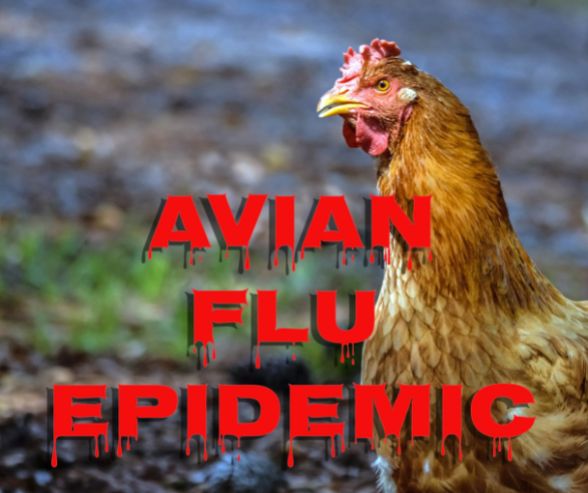Avian flu, also known as bird flu, is a viral disease that affects birds, including chickens. It is caused by the influenza A virus, and it can be highly contagious and potentially fatal for chickens. The disease can have a significant impact on the poultry industry, and it is important for poultry farmers to be aware of the symptoms of avian flu in chickens. In this article, we will discuss the symptoms, causes, and treatment of avian flu in chickens.
What is Avian Flu in Chickens?
Avian flu is a viral disease that affects birds, including chickens. The disease is caused by the influenza A virus, which can be further classified into different subtypes based on the type of hemagglutinin (HA) and neuraminidase (NA) proteins on the surface of the virus. There are 18 different HA subtypes and 11 different NA subtypes, and different combinations of these subtypes can result in different strains of the virus.
Avian flu can be classified as low pathogenic avian influenza (LPAI) or high pathogenic avian influenza (HPAI), depending on the severity of the disease. LPAI is a milder form of avian flu, and it can cause mild symptoms or no symptoms in chickens. HPAI, on the other hand, is a more severe form of the disease, and it can cause severe respiratory distress, neurological signs, and death in chickens.
Symptoms of Avian Flu in Chickens
The symptoms of avian flu in chickens can vary depending on the severity of the disease. In some cases, the disease can be asymptomatic, and chickens may not show any signs of illness. In other cases, the disease can cause severe symptoms and mortality.
Some of the common symptoms of avian flu in chickens include:
- Respiratory Symptoms: Avian flu can cause respiratory symptoms in chickens, including coughing, sneezing, and nasal discharge.
- Digestive Symptoms: The disease can also cause digestive symptoms in chickens, including diarrhea and loss of appetite.
- Nervous System Symptoms: In some cases, avian flu can affect the nervous system of chickens, causing them to exhibit neurological signs such as depression, paralysis, and tremors.
- Egg Production: The disease can also affect egg production in chickens, leading to a decrease in egg production or the production of abnormal eggs.
- Mortality: In severe cases of avian flu, the disease can cause high mortality rates in chickens.
Causes of Avian Flu in Chickens
Avian flu is caused by the influenza A virus, which can be transmitted from infected birds to healthy birds. The virus can be spread through direct contact with infected birds or their droppings, as well as through contaminated surfaces or objects. The virus can also be spread through the air, especially in crowded or poorly ventilated environments.
Prevention and Treatment of Avian Flu in Chickens
Prevention is the best way to avoid the spread of avian flu in chickens. Poultry farmers should implement biosecurity measures to prevent the introduction of the virus into their flocks. These measures can include:
- Isolating sick birds and culling them if necessary.
- Restricting access to the farm and the poultry houses.
- Cleaning and disinfecting equipment, surfaces, and facilities regularly.
- Practicing good hygiene and hand washing.
- Using vaccines to protect against avian flu.
Treatment options for avian flu in chickens are limited. There is no specific treatment for the disease, and the use of antibiotics is not effective against viral infections. If a chicken is infected with avian flu, it may be necessary to cull the bird to prevent the spread of the virus to other birds.
In some cases, antiviral drugs may be used to treat avian flu in chickens, but these drugs are expensive and may not be widely available. Additionally, the use of antiviral drugs can also contribute to the development of drug-resistant strains of the virus, which can be a concern for public health.
FAQs
Q: Can avian flu be transmitted to humans? A: Yes, avian flu can be transmitted to humans, but it is relatively rare. The virus can be transmitted through direct contact with infected birds, their droppings, or contaminated surfaces.
Q: What are the symptoms of avian flu in humans? A: The symptoms of avian flu in humans can range from mild to severe, and they can include fever, cough, sore throat, and respiratory distress.
Q: How can poultry farmers prevent the spread of avian flu? A: Poultry farmers can prevent the spread of avian flu by implementing biosecurity measures, including isolating sick birds, restricting access to the farm and poultry houses, and practicing good hygiene.
Q: Can avian flu be treated with antibiotics? A: No, avian flu is a viral infection, and antibiotics are not effective against viral infections.
Q: Is there a vaccine for avian flu in chickens? A: Yes, there are vaccines available to protect chickens against avian flu. Poultry farmers can work with their veterinarians to determine the best vaccination strategy for their flocks.
Conclusion
Avian flu is a viral disease that can affect chickens, and it can have a significant impact on the poultry industry. The symptoms of avian flu in chickens can vary depending on the severity of the disease, and prevention is the best way to avoid the spread of the virus. Poultry farmers can implement biosecurity measures and use vaccines to protect their flocks against avian flu.
While treatment options for avian flu in chickens are limited, early detection and rapid response can help to prevent the spread of the disease. By being aware of the symptoms and causes of avian flu in chickens, poultry farmers can take proactive steps to protect their flocks and the wider industry.

Shannon Stansberry has been engaged in the business of raising chickens for more than 12 years. In 2016, she accomplished the Agriculture & Natural Resources program at Mt. San Antonio College. At present, she tends to more than 80 chickens on her 4-hectare farm. Shannon regularly shares her insights and experience on how to raise healthy and contented chickens on the platform Typesofchickens.com

